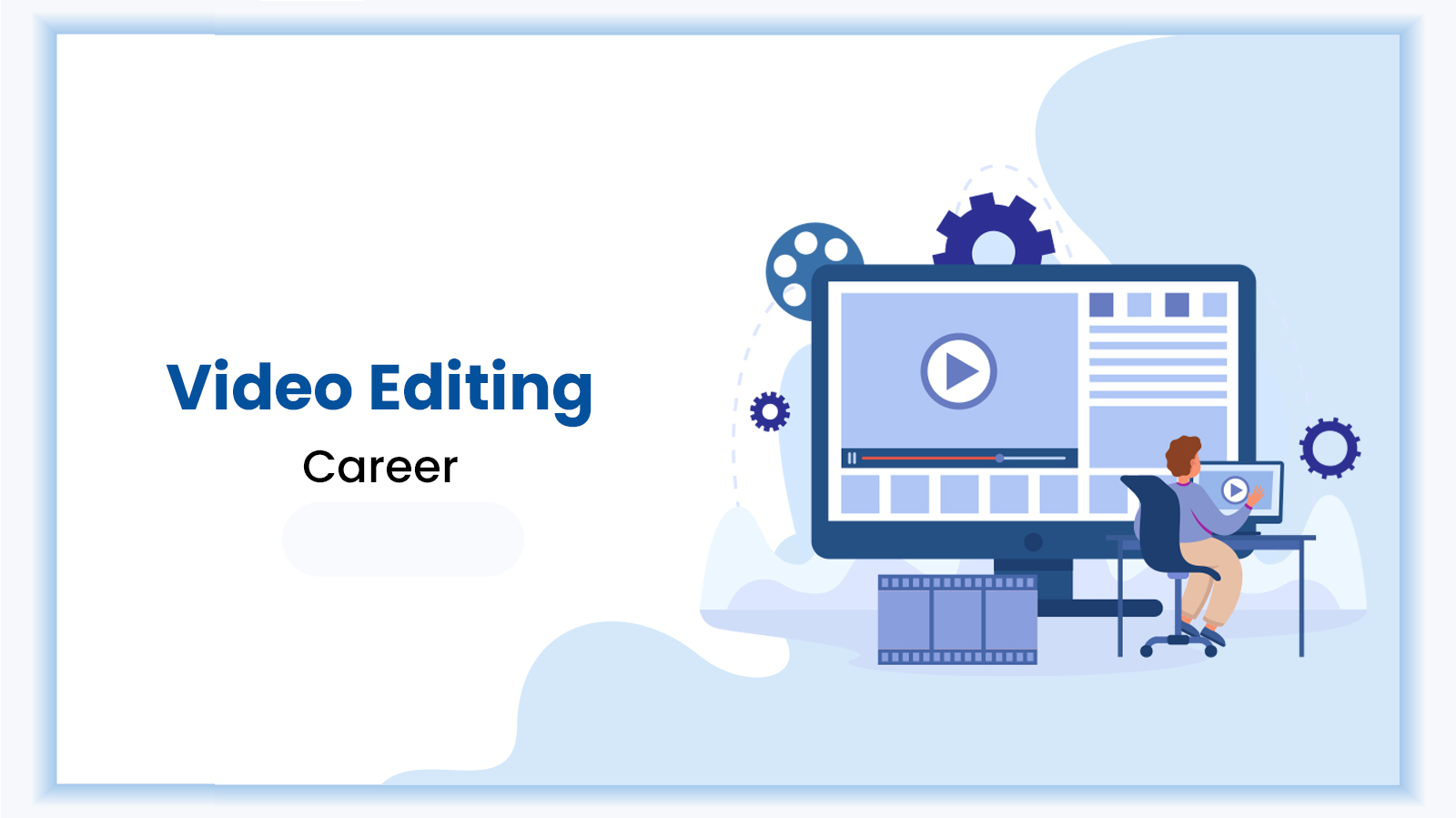Looking to make a career in Video Editing? As Netflix, Amazon, Disney+, HBO Max, and other OTT platforms compete for dominance, a high number of TV and film content is produced, and the demand for good video editing keeps on increasing.
The scenes that best achieve the objectives or vision of the directors are assembled by video editors. This is done by carefully examining camera operator recordings. You could work in a variety of industries to create engaging videos that inform or amuse viewers by choosing a career in video editing.
If you have a knack for video editing, then pursuing your career in such a domain is quite a nice idea. To bring stories to life on the screen, you must understand how it works, have technical skills, and be creative. You can also enrol in multiple video editing courses to learn more about this field.
Video Editing - A Brief Overview
The process of turning unpolished films into interesting stories is known as video editing. It’s similar to putting fascinating puzzle pieces together. The footage is thoroughly examined by the editor, who then chooses the best segments to keep.
There are several ways to link the shots in a video. These connections, often referred to as cuts, provide a particular contribution to the story. The editor arranges the images logically while taking into account how they affect viewers’ emotions. Additionally, they examine how the pictures look, where the audience is focused, and how everything fits together.
Editors mainly pay attention to how our eyes move when watching a video. They want to be certain that we understand what is happening and that our sights are on the right path. The way the photographs are arranged makes logic, and they appear to be well done.
The film’s editors play with a variety of perspectives and angles to make it more engaging. They want us to get the impression that we are actually experiencing the story firsthand.
What Skills Do You Need To Become A Video Editor?
Whether your goal is to become a professional video editor or simply improve your editing abilities, there are a few things that you should consider to be successful. A Premieree Pro course can help you acquire essential skills in video editing.
It’s frequently required to have a bachelor’s degree in film editing or a closely related field to become an expert video editor. Editors need creative skills in filmmaking and videography to bring a project’s intended finish to life. Furthermore, actual experience editing various types of movies, along with integrating sound effects, and transitions, is essential for a successful video editing as a career.
Some other prerequisites to becoming a video editor include:
1. Technical proficiency
A strong technical foundation is needed to be successful as a video editor. Having rich expertise in a wide range of video editing tools like Adobe Premieree Pro, Final Cut Pro, or DaVinci Resolve will help to enhance your editing skills. Knowing how to navigate the timeline, trim footage, create transitions and effects, and use editing tools and shortcuts enhances productivity and workflow.
It is also highly critical to grasp the different file formats and codecs used in video editing, as well as their benefits, downsides, and effects on video size and quality. Video editors may advance their careers and produce high-quality work by learning these technical skills.
2. Creative Mindset
You must be creative and able to tell compelling stories to be a good video editor. Set up the film, try different camera angles, and make eye-catching images.
Also, recognize the significance of teamwork with directors, producers, and clients. Adjust your editing technique to meet the project’s requirements while keeping the plot consistent to make video editing as a career.
3. Competitive Communication Skills
Understanding client expectations and working productively with the production team requires excellent communication skills. Active listening is required to fully comprehend the client’s vision, goals, and preferences. You can ensure that you are meeting their expectations and meeting their needs by asking pertinent questions and requesting clarification.
Keeping your communication professional and offering helpful criticism can promote a positive working environment. You can make sure that everyone involved in the project is on the same page and can cooperate to produce the desired results by communicating effectively.
4. Continuous Learning
In the ever-changing area of video editing, staying updated with the newest trends and methodologies is vital. Conduct some industry study to achieve this, which may be performed by reading articles, attending tutorials, and keeping up with experienced video editors.
Experimentation and practice must be ongoing in order to improve your skills. Work on personal projects or as a freelancer to improve your skills, and experiment with different editing techniques, effects, and transitions to broaden your creative range.
Moreover, solicit feedback and criticism from your peers, mentors, and online communities. As an editor, you can advance by improving your editing skills through constructive criticism.
Top-Notch Career Paths In Video Editor
You can include video editing as a career in a variety of fields, depending on the tasks and productions you want to work on. You can also enrol in an After Effects course to dig deep into the vast field of video editing. The following career paths are quite common in the field of video editing:
1. Television Studio Editor
Many television studio editors put together footage for a variety of TV formats. They add a variety of sound effects to video footage to make it more entertaining to watch.
Since a majority of episodes air near the end of each season, television studio editors frequently work under tight deadlines and must submit error-free final products.
Some TV editors assist with the oversight of show design, camera angles, lighting, and sound during filming to ensure that they match their edited footage.
2. Animator
A cartoon animator uses many tools and methodologies to produce moving graphics and stories. Several animation video editors can easily create these images for a variety of projects. These take into account movies, video games, etc.
Typically, they are responsible for building a variety of components such as scenery, background art, or characters. Many animators have exceptional technical skills since they commonly employ motion capture data and video animation tools to create these compelling graphics.
The bulk of these specialists create these designs and then attempt to capture them as animated graphics using their software system.
3. Marketing Video Editor
Most video editors that work for marketing teams mainly generate instructional and promotional videos. If they are part of a smaller editing team, these professionals might collect the video and edit it all together.
They might work on commercials, product videos, and instructive movies, among other types of videos. Most marketing video editors look into and follow a company’s brand guidelines. This makes sure it complies with the appropriate standards while matching the brand’s image, and fairly represents the business.
Can You Easily Get A Job As A Video Editor?
Yes, you can easily get a job as a video editor because:
1. High Demand
Since various firms utilise video for marketing, video editors are essential. Many networks and organisations have in-house editors for creative material, while services like Upwork and Fiverr allow editors to engage with both corporations and individual producers.
2. Flexible Location
Is it possible for video editing as a career to operate remotely? The common response is yes. You can accomplish the majority of editing chores from home and contact clients if you have the necessary tools.
Remote work may not be an option if you’re working on a project that demands something that your regular home setup can’t handle. This can be like 4K resolution or high-definition surround sound. In some cases, you’ll need to use a professional editing suite.
3. Experience Matters
While you advance to the position of editor, think about working as an assistant editor. This could aid in your understanding of editing techniques and the various shots and cuts that other editors employ.
Final Words
Video editing steps mainly involve selecting the appropriate software, preparing your video materials, assembling everything, and exporting the finished product.
As a beginner, you lack the necessary professional competence for multiple jobs. Understanding the main editing tools for video editing as a career may suffice initially, but advanced skills will be required for a bright future. If you are someone looking for a video editing institute in Dubai, contact DG training today!
Also, if you’re looking to start with video editing software, we can help you choose the right one. Check out our blog: Premiere Pro or After Effects- What should I learn first as a student?
FAQs
There are several popular alternatives to video editing software. DaVinci Resolve, Final Cut Pro, and Adobe Premieree Pro are among them.
There are several methods for learning video editing. You can pursue formal education or take film or video creative lessons. There are also self-learning online forums, courses, and directions.
The amount of time required to edit a video is not at all fixed. It depends on a number of factors. These primarily include the length and difficulty level of the content, the editor’s level of experience and much more.



